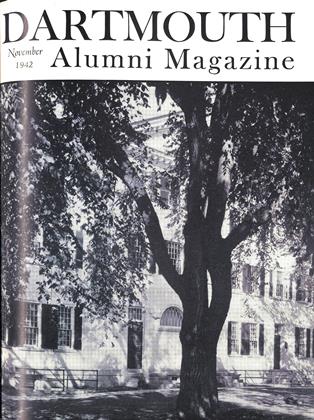PRESIDENT HOPKINS raises no objection to lowering of the draft age to 18. If such should be the course of events, the College would meet the problem by adjusting to it, the President said in a recent interview.
Following is the complete text of President Hopkins's statement as given to Robert A. Williams '43 for the Worcester Eve-
ning Gazette: "I take no exception to the argument that the Selective Service system should include those from eighteen years of age up. In regard to the urgency of the present war emergency, nearly every one, I think, accepts the obvious fact that this action is necessary and that only political considerations are deferring it. Naturally, as a college administrator I don't welcome the very grave problems which such an action will bring down upon the colleges, but I am prepared to meet them as best we can in the interests of the national security.
"The greatest threat of recent years to democracy has been the cancerous growth of a belief that men were entitled to privilege without responsibility, and that mankind was justified in claiming freedom in large measure, even when unwilling to safeguard freedom at all. It so happens that I ave for a long time believed in the desirability of a universal service requirement upon citizens of the United States and I think it might well become operative upon men at eighteen years of age.
"I yield to no one in my liking and respect for college youth, but it is a characteristic of youth to be only as old as it needs to be. In the past, when needful, men of eighteen to twenty-two, the conventional college age, have commanded ships in peace and in war, have assumed major responsibilities, and have done great deeds. The time has come again when men need to "grow up" faster. As a Dartmouth man I should like to have my college possessed of an undergraduate body which had been matured under the training and discipline of a carefully devised universal service requirement upon all youth. I believe that the increased intelligence with which youth would utilize the advantages of higher education in such circumstances would far more than offset a year's deferred enrollment in our colleges. Furthermore, I believe that under such conditions the society for which higher education exists would be greatly enriched by the greater utilization of intellectual values which men would make of advantages available in their college courses.
"To the inquiry as to what the colleges will do if the draft age is lowered to eighteen, the answer is, they will adjust themselves to it. Colleges have always been in the process of adapting themselves to changes in social conditions. Colleges periodically have had to meet crises. There is no reason to suppose that colleges are less capable of adaptation at the present time than in years past. Colleges, like other things, were made for man, not man for the colleges."
 View Full Issue
View Full Issue
More From This Issue
-
 Article
ArticleThe American Dream: Growth of a Nation
November 1942 By KENNETH ALLAN ROBINSON -
 Article
ArticleCollege Finances Sound
November 1942 -
 Class Notes
Class Notes1918*
November 1942 By ERNEST H. EARLEY, DONALD L. BARR -
 Class Notes
Class Notes1936*
November 1942 By NORBERT HOFMAN JR., JOHN E. MORRISON JR. -
 Sports
SportsBig Green Teams
November 1942 By ELMER STEVENS JR. '43. -
 Sports
SportsTHOSE WERE HAPPY DAYS
November 1942 By Jack Childs '09







